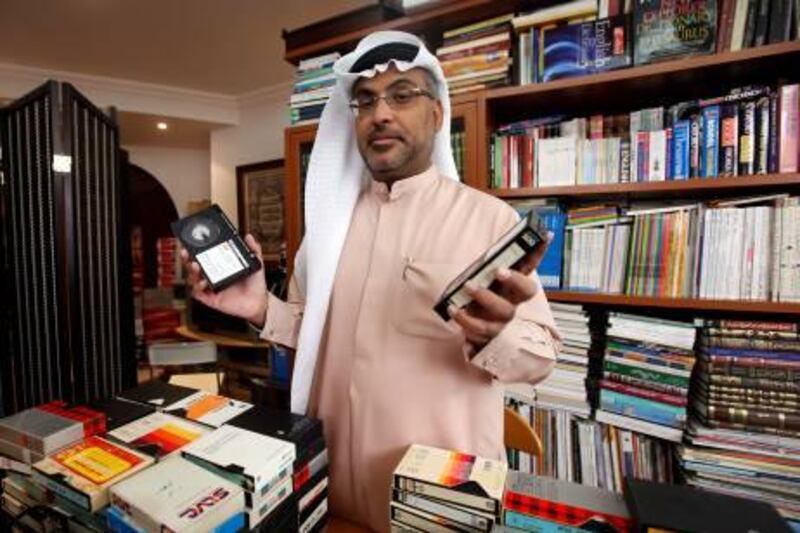Dubai // As a teenager in the 1970s, Aqeel al Showab began chronicling life in the Emirates, filming events for posterity with an 8mm camera. Now he has the most extensive historical archive in the country.
Mr al Showab said he saw the changes taking place in the UAE, and "knew a lot of things would start disappearing".
Until the end of the decade he filmed all kinds of events, including royal weddings, where he would turn his camera on traditional dancing and celebrations.
"From the 1970s to the end of the 1990s, 10 years in the UAE equalled 100 years in the West in terms of change," he said.
Mr al Showab took photographs of old houses and filmed the properties of Dubai's ruling family in the Shindagha district and Sheikh Saeed Al Maktoum's residence with a soundless cinematic camera.
"I also started recording any event happening on TV because in the UAE, and the Gulf generally, life was changing very fast," he said.
Mr al Showab has more than 20,000 hours of television recordings on 5,000 Betamax and 5,000 VHS cassette tapes.
"I would record programmes from songs, folklore and sports to Sheikh Zayed Al Nahyan interviews, inauguration ceremonies of projects such as the four stadiums, Al Shahab, Al Wasl, Al Nasser and Al Ahli, and the Dubai airport of the 1970s.
"It's interesting for me because it's about our local life and I consider it a national duty as I am recording this for the next generation."
Moath bin Hafez, a 27-year-old Emirati director, discovered Mr al Showab through his television show, Nawader, which seeks out talent, collections and hobbies in the UAE.
"I was a bit sceptical when my colleague recommended Mr al Showab because everyone owns old photos. But when he showed me his collection, it really attracted my attention. His 1980s recordings filled me with nostalgia and I found it amazing."
Mr bin Hafez was referring to a video about Dubai called Three Degrees Of Separation.
"There was even some footage that I'd never seen before and it was really heartwarming," he said.
Mr al Showab inherited his hobby from his father, the first professional Emirati photographer in the country, and began filming events when he was aged 14.
"That's when I felt the UAE was about to change," he said.
In the 1960s, Mr al Showab's father, then a tailor in the UAE, moved the family to Saudi Arabia for work. The UAE was a hard place to make money back then, Mr al Showab said.
After six months, however, his father yearned for the UAE and returned to Ras al Khaimah to become a professional photographer.
"He opened his own studio, the first in the UAE, and then moved to Dubai where he would photograph events with Sheikh Rashid Al Maktoum." He would work all night developing film.
Mr al Showab's wife, Lulwa, said no one could match her husband's interest in UAE history, which made her proud. "He is always busy with his collection and he even turned our majlis into a storage room," she said. "When we moved, his archives took up the space of three pick-up trucks and although it was problematic for me at first, I decided to help him organise it."
As well as his extensive television recordings, Mr al Showab also has thousands of photographs and 10,000 Arabic, Indian, Jordanian and English films that aired on Dubai television. His collection is scattered around his villa and must remain in cool conditions because of its fragile condition.
"These films you will never see aired again and most of them would win awards if they entered film festivals," he said.
"We used to watch Kuwait TV from Dubai, then Sheikh Rashid opened Dubai's first colour TV, and it's interesting for me because it's about our local life."
Mr al Showab watches an hour of his recordings every night before bed. "It's my happiness," he said.
"I didn't do this to show to people, but I am willing to give out copies from the DVDs I started converting to anyone who asks."






